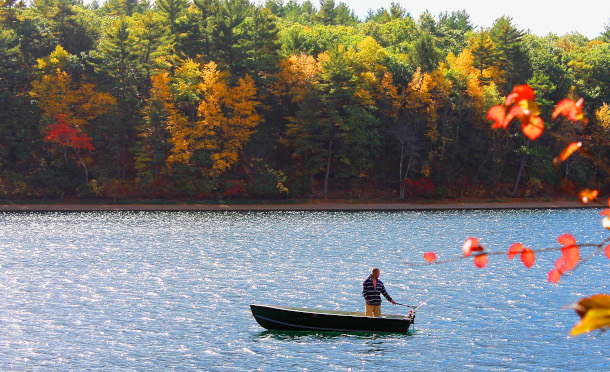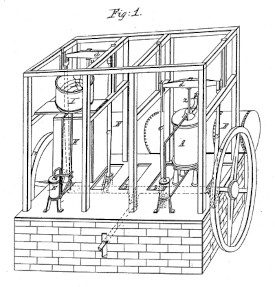From the History Books
Air Date: Week of July 12, 2024

The northern shore of Walden Pond, close to where Thoreau conducted his famous experiment in minimal living. (Photo: Terryballard, Wikimedia Commons, CC BY-SA 4.0)
This week, Living on Earth Contributor Peter Dykstra joins Host Aynsley O’Neill to celebrate the July 12, 1817, birth of nature writer Henry David Thoreau. They also mark the July 1850 invention of icemaking using compressed air.
Transcript
O'NEILL: And now it's time to turn to our living on Earth contributor Peter Dykstra. He's got a few stories from the history books that we're going to take a look at now. Hey, Peter, what do you have for me this week?
DYKSTRA: Hi. Aynsley. The first one comes on July 12th 1817, which was the birthdate of Henry David Thoreau. That's the way it apparently was pronounced back in the 19th century, even though we say Thoreau these days. He was born, of course in Concord, Massachusetts, not “Con-cord”. His books, including Walden and Cape Cod, are regarded as some of the 19th century's best writing on our relationship with nature. I was really touched by Cape Cod, which is a journal of Thoreau's walk from Chatham up to Provincetown, the entire area known as the Outer Cape, in what was then of pristine beach, but even then he saw signs of human incursion and development and wrote about them. That's one of the things that has made me fascinated with Cape Cod for my entire life.

Henry David Thoreau wore many hats: nature enthusiast, writer, poet, and philosopher. He played a key role in the transcendentalist movement. His most famous work, Walden, explores the idea of a simple life immersed in nature. (Photo: National Portrait Gallery, Wikimedia Commons, Public domain)
O'NEILL: Well, first of all, Peter, thank you for that Thoreau correction before we even got started. His writing has really been so influential in the modern environmentalist movement.
DYKSTRA: The books are absolutely timeless, and they tell of lessons learned about dealing with the environment. And of course, lessons not learned.
O'NEILL: Hmmm. And still to be learned. All right, Peter, what else do you have for me this week?
DYKSTRA: July 14th 1850. There's a doctor in Apalachicola, Florida, named John Gorrie. He was seeking a method of cooling off patients that were suffering from malaria and yellow fever. Gorrie demonstrated his invention for manufacturing ice using highly compressed air. Air compression is still the basis so many years later in refrigeration, air conditioning, and ice making.
O'NEILL: Gorrie's method of compressed air is a really interesting insight into how people make ice. I don't know anything about it. If I need ice, I just pour some water into an ice cube tray and put it in the freezer.
DYKSTRA: That's the easy way to do it here in the 21st century. But Gorrie is credited and is a local hero, at least in the Florida Panhandle for saving untold lives. And it's the reason that places like Phoenix and Las Vegas, and even Los Angeles became large cities because all of a sudden they became livable.

Illustration of John Gorrie's ice-making apparatus. This illustration is taken from the U.S. patent document 8080, dated May 6, 1851. (Photo: Author Unknown, Wikimedia Commons, Public domain)
O'NEILL: Alright. Well, Peter, thank you so much for bringing us these stories from the history books. Peter Dykstra is a living on Earth contributor and we will talk to you again soon.
DYKSTRA: All right Aynsley, thanks a lot and talk to you soon.
O'NEILL: And there's more on the stories on our website. That's L-O-E dot O-R-G.
Links
Living on Earth wants to hear from you!
Living on Earth
62 Calef Highway, Suite 212
Lee, NH 03861
Telephone: 617-287-4121
E-mail: comments@loe.org
Newsletter [Click here]
Donate to Living on Earth!
Living on Earth is an independent media program and relies entirely on contributions from listeners and institutions supporting public service. Please donate now to preserve an independent environmental voice.
NewsletterLiving on Earth offers a weekly delivery of the show's rundown to your mailbox. Sign up for our newsletter today!
 Sailors For The Sea: Be the change you want to sea.
Sailors For The Sea: Be the change you want to sea.
 The Grantham Foundation for the Protection of the Environment: Committed to protecting and improving the health of the global environment.
The Grantham Foundation for the Protection of the Environment: Committed to protecting and improving the health of the global environment.
 Contribute to Living on Earth and receive, as our gift to you, an archival print of one of Mark Seth Lender's extraordinary wildlife photographs. Follow the link to see Mark's current collection of photographs.
Contribute to Living on Earth and receive, as our gift to you, an archival print of one of Mark Seth Lender's extraordinary wildlife photographs. Follow the link to see Mark's current collection of photographs.
 Buy a signed copy of Mark Seth Lender's book Smeagull the Seagull & support Living on Earth
Buy a signed copy of Mark Seth Lender's book Smeagull the Seagull & support Living on Earth

